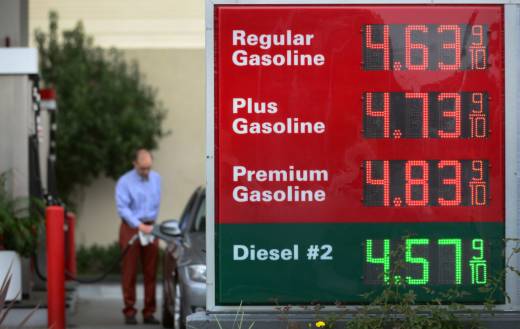"There’s a lot of building anger among the shrinking middle class and those who have aspirations to make it into the middle class but can’t because of the high cost of living in California. And I think this ballot measure is an outlet for that anger."
Compared with property taxes, which mostly affect homeowners, fuel taxes are "a broad-based tax that hits literally everybody," noted GOP consultant Wayne Johnson. "So (compared with Prop. 13) it's a much better motivator for people and it crystallizes people’s thinking because it’s easy to understand."
Johnson, who worked with anti-tax crusader and Proposition 13 co-author Paul Gann decades ago and is now working for Republican gubernatorial candidate John Cox, said last year's passage of transportation measure SB 1 highlights how Democrats have contributed to the state's affordability crisis.
"It’s a very easy, recognizable example of the failure of the last eight years. There’s been a lot of prosperity that’s forgotten millions of Californians," Johnson said, adding that prosperity for coastal Californians allows Democratic politicians to "sip their chardonnay on the deck of their $4 million home thinking everything is fine."
Johnson is hoping the gas tax repeal, if it qualifies for November, will help drive Republican voters to the polls.
There are similarities between the California political climate in 1978 and today, notably the large state budget surplus. Forty years ago the surplus was $2.9 billion, much larger as a percentage of the state budget than today's $9 billion surplus. It led many Republicans then — as now — to say the state should refund the money to taxpayers rather than spend it.
However, Mark Baldassare, who heads the Public Policy Institute of California (PPIC), said the differences between then and now outweigh the similarities.
"Proposition 13 came at a time when Californians were very anxious, not just about the cost of housing but about the cost of everything," Baldassare said.
By election day in 1978, the U.S. inflation rate was nearly 9 percent.
"There was a general concern about prices spiraling out of control and the economy being in a place where it was difficult for people to know what they were going to need to live on," Baldassare said, because of both inflation and the lack of controls on property tax increases.
By comparison, today's inflation rate is under 3 percent. And Baldassare said while housing prices have spiraled up quickly in recent years, leaving many unable to afford a home, "most Californians feel they are generally in good shape financially."
PPIC recently released a study examining voter attitudes about Proposition 13 today. A majority of Californians (57 percent) and likely voters (65 percent) feel that Proposition 13 has been "mostly a good thing for the state." Even among Californians ages 35 to 54, a slight majority think limiting property tax increases has been mostly a good thing.
Not all Republicans see the gas tax as this year's version of Proposition 13. GOP consultant Rob Stutzman, who worked unsuccessfully to convince the Republican congressional delegation from California not to support the repeal, said the two issues are fundamentally different.
"The gas tax is simply unpopular," Stutzman said.
But, he added, "It’s not costing anyone their home."
He said polling he has seen suggests support for repealing the tax increase is in the low 50s, with opinion pretty divided on the cost/benefit analysis of raising gas taxes to fund transportation improvements.
"The problem with that thinking is this repeal isn’t wildly popular — it's only moderately popular," Stutzman said. "And it will draw a $30 to $40 million campaign, some of it funded by Republican donors like road construction and engineering companies, to oppose it. That essentially works against Republican interests."
Stutzman adds there's no evidence that the gas tax could help a Republican candidate running statewide — like John Cox — overcome their large disadvantages in voter registration.
Then there's the current governor, Jerry Brown. In 2014, he told the Los Angeles Times that he'd learned from his failure to have a bank of campaign cash to draw upon to ward off political enemies.
Brown suggested that if he'd had such an account in 1978, he could have used it to promote an alternative measure to Proposition 13.
Four years ago he told the Times, "There may be things to be done that will involve a ballot measure," adding, "I do think having a credible war chest will overcome whatever infirmities lame-duck governors might ordinarily suffer from."
He learned the lesson well. Brown's political account is currently flush with $15 million — some of which could surely be spent to oppose the gas tax repeal on the November ballot.

